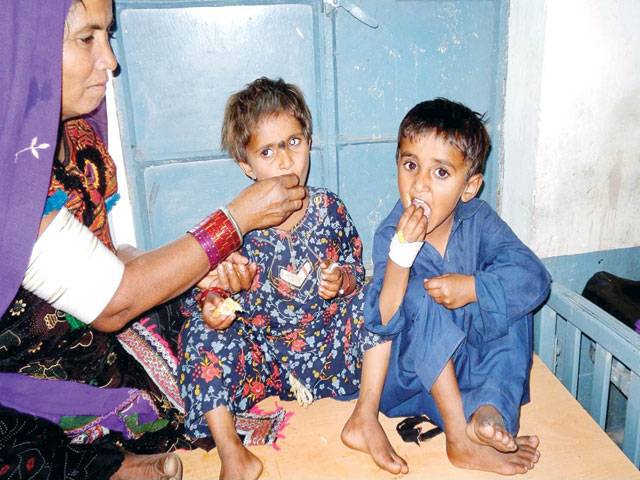ISLAMABAD - The World Food Programme and Sindh government jointly launched Rs 600 million project to assist around 348,000 children, and pregnant and lactating women suffering from malnutrition to prevent stunting and micronutrient deficiencies.
The project initiated by Sindh government’s health department, in collaboration with WFP and World Health Organisation would help prevent stunting (chronic malnutrition), primarily focusing at children, pregnant and lactating women in selected union councils of Thatta and Sajawal districts in Sindh.
It would also prevent their intergenerational transmission using locally produced specialized nutritious products and promoting appropriate infant and young child feeding practices utilising effective behavior change communication strategies. This will also contribute to reducing the incidence of low birth weight as maternal nutritional status of around 127,000 pregnant and lactating women will be improved.
According to the government survey, the food insecurity and the prevalence of under-nutrition in Sindh was higher compared to most of the other provinces of the country. During the launching ceremony, WFP Representative and Country Director in Pakistan, Lola Castro together with the WHO team handed over medical grade anthropometric equipment to Aslam Pachu, Additional Secretary Health, government of Sindh. This equipment will be utilized for assessing the nutritional status of mothers and children and about 550 kits were handed over valued at 21 million rupees.
WFP Representative Lola Castro emphasized that National Nutrition Survey 2011 estimates stunting prevalence in children under five in Sindh at 49.8 percent and anaemia levels at 72.5 per cent, while anaemia in pregnant and lactating women is estimated 60.7 per cent.
She further stressed that there was an urgent need of addressing the problem the earliest possible, during the first 1,000 days of life “window of opportunity” (from conception up to the first 2 years) in order to break the intergenerational transmission of stunting.
She said the WFP is supporting federal and Sindh governments in many major initiatives, including this intervention for prevention of stunting and addressing micronutrient deficiencies in Thatta with a special focus on `first 1000 days’ from pregnancy upto two years of age and children under 5 years of age.
Thatta and Sajawal are part of the 19 priority districts identified by the government of Sindh to address high prevalence of under-nutrition in children as well as pregnant and lactating women, Lola added. The districts are also ranked high in terms of food insecurity.
“This initiative shall strengthen evidence on the effectiveness of such preventive interventions. The project will also contribute to new operational research to ascertain the optimal length of preventive interventions and the use of specialized nutritious foods.” Lola Castro said.
Stunting prevention is also one of the global target set by World Health Assembly, food based approaches clubbed with the appropriate infant and young children feeding strategies. Campaigns like this will definitely set the momentum for reduction in stunting, Lola said.
Friday, April 19, 2024
WFP helps Sindh treat malnourished women, children

Caption: WFP helps Sindh treat malnourished women, children
Empowering Women: The Vision of Maryam Nawaz Sharif
8:37 PM | April 19, 2024
President Zardari confers Nishan-i-Imtiaz (M) award on Turkish CGS
8:23 PM | April 19, 2024
NA speaker suspends two MNAs for disruptive behavior during presidential address
8:20 PM | April 19, 2024
PM Shehbaz orders accelerating countrywide drive against smuggling
8:19 PM | April 19, 2024
LHC allows PTI to hold rally in NA-119
8:18 PM | April 19, 2024
A Tense Neighbourhood
April 19, 2024
Dubai Underwater
April 19, 2024
X Debate Continues
April 19, 2024
Hepatitis Challenge
April 18, 2024
IMF Predictions
April 18, 2024
Kite tragedy
April 19, 2024
Discipline dilemma
April 19, 2024
Urgent plea
April 19, 2024
Justice denied
April 18, 2024
AI dilemmas unveiled
April 18, 2024
ePaper - Nawaiwaqt
Advertisement
Nawaiwaqt Group | Copyright © 2024





